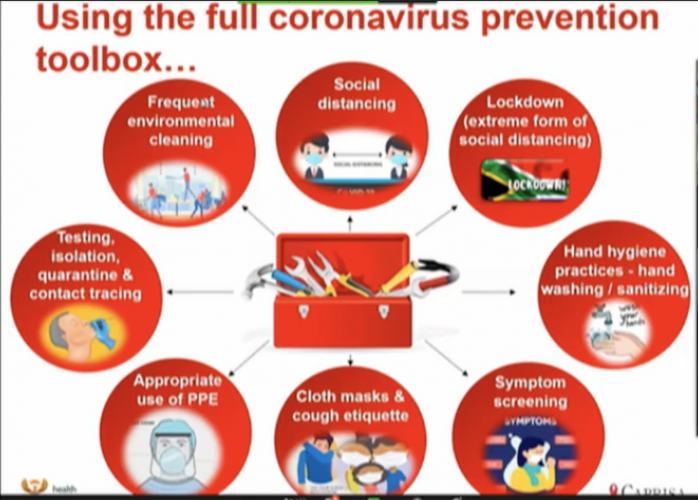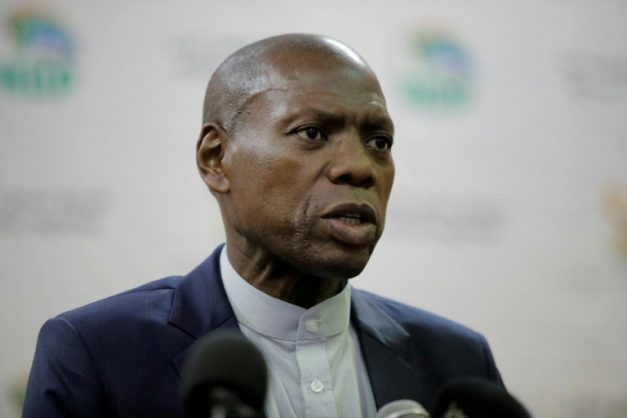Mkhize: The country will be split into 3 Covid areas, with ‘out of control’ being one
The health minister and his advisers briefed the country on what comes next for the health sector and the country in level 3 of lockdown.
by Charles CilliersMkhize is also a veteran of South Africa's fight against AIDS. AFP/File/GUILLEM SARTORIO
Minister of Health Zweli Mkhize was on Friday joined by members of the Ministerial Advisory Committee, senior officials from the Department of Health and the leadership of health entities including SAHPRA, NHLS and NICD in a virtual press briefing on Covid-19 health interventions ahead of the country’s move to alert level three.
The minister explained that South Africa had to open up the country’s economy in a way that allows people to sustain their livelihoods while learning to live with the virus in their midst, since poverty is just as, or more, dangerous as the virus itself.
South Africa’s approach would therefore be different than China’s, which had managed to contain the virus and bring down the infection rate. He conceded that this was no longer possible in South Africa and the country would just need to learn to live with the virus and people would need to take personal care to avoid being infected through using sanitisation, social distance and other tools.
“We do understand that this debate has been very strong in the country but we can’t be in a position of keeping the lockdown as it was,” said the minister.
He called out sectors calling for their own sectors to be opened but expecting others to be closed.
“We have taken a differentiated approach, with every part of the country going into level 3.”
After that the country would be divided into three areas: low transmission, high transmission (hotspots) and areas that were getting “completely out of control”.
The approach would be different in each area, which the briefing then went into further.
The chairperson of the advisory committee, Prof Salim Abdool Karim, in his presentation explained the importance of “flattening the curve”, which South Africa had opted to do as early as possible, unlike the United Kingdom.
He said trying to eliminate the virus from the country entirely was next to impossible because of how long it takes for infected people to start showing symptoms, and during that time they could infect others.
Between 20% to 50% of infections would be categorised as asymptomatic and they could continue to spread it.
Since the virus was highly infectious and each person could infect at least two other people, it would also be difficult to fight.
“This virus is also associated with super-spreading events. We saw this in South Korea.” One person there had potentially infected thousands of people at a lunch.
“Finally, even if you do get the spread under the control, because we do not have adequate immunity, you always run the risk of further waves of outbreaks.” He referenced Singapore, which had further outbreaks after containing the outbreak.
“We have chosen the alternative, which is to flatten the curve.”
The professor explained that South Africa’s early lockdown had succeeded in slowing the doubling rate of the infection from every two days to every 15 days, but that had reduced to every 12 since the easing of the lockdown.
“We are now trying to implement the full coronavirus prevention toolbox. One of those is the lockdown.”
In one slide, he showed what the other available “tools” were, which needed to be applied in the case of every risk. He slammed the practice of human beings being “disinfected” through being sprayed in supposed “fumigation tunnels”.
He said there was no evidence that fumigation tunnels did any good, and they were instead decidedly harmful.

Abdool Karim touched on the fact that the country had reached a significant testing backlog, with a dramatic increase in the number of tests being conducted, and testing kits running out – also considering there has been a global shortage of test kits.
The professor said that although the Western Cape was seeing far more cases of the virus than elsewhere in the country, the data was suggesting that these were caused by “superspreading events” and the province had come up with a strategy to deal with this.
Outbreaks would not necessarily mean “shutting everything down”, but instead following a “systematic approach” in dealing with the pandemic.
He said South Africa had done well in keeping its infection far lower than countries like the UK, and that it had “started with flattening the curve” but this effort would need to continue for months or even years, depending on when a vaccine became available.
The lockdown had, to date, bought the country time to prepare for the health onslaught of the outbreak, but there was “simply no room for complacency” and the population would need to remain vigilant.
“The Western Cape may simply be an early indication of what we may see elsewhere in the country.”
He said they had learnt lessons from the Western Cape in learning how the country might be able to work to prevent “raging fires”.
Watch the briefing below:
